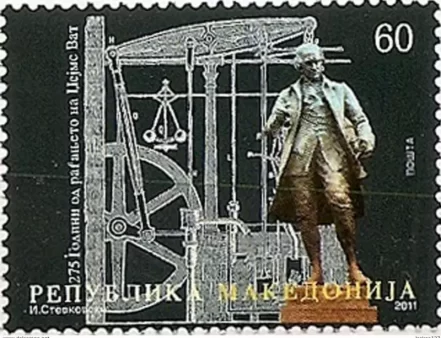Macedonia year 2011 stamp inventor James Watt MNH **
James Watt (1736–1819) was a Scottish inventor, engineer, and scientist whose improvements to the steam engine played a crucial role in the Industrial Revolution. Here are some key aspects of his life and contributions:
Steam Engine Improvements: In 1769, James Watt patented a design for a separate condenser for steam engines, which significantly improved their efficiency and fuel consumption. His invention made steam engines more practical and economical for a wide range of industrial applications, revolutionizing transportation, manufacturing, and agriculture.
Watt’s Steam Engine: Watt’s improvements to the steam engine included the addition of a separate condenser, a redesigned cylinder, and a mechanism for converting reciprocating motion into rotary motion. His innovations made steam engines more powerful, reliable, and versatile, leading to their widespread adoption in factories, mines, and transportation systems.
Unit of Power: Watt introduced the concept of horsepower as a unit of power to measure the output of steam engines. One horsepower was defined as the amount of work required to lift 33,000 pounds one foot in one minute. This standard unit of measurement became widely used in engineering and remains in use today.
Patents and Partnerships: James Watt formed a successful partnership with the industrialist Matthew Boulton, who provided financial backing and business expertise for Watt’s inventions. Together, they established the Soho Foundry in Birmingham, England, where they manufactured steam engines and other industrial machinery.
Other Inventions: In addition to his work on steam engines, Watt made significant contributions to other fields, including chemistry, metallurgy, and instrument-making. He invented a copying machine, a steam indicator for measuring engine performance, and a process for bleaching paper.
Legacy: James Watt’s improvements to the steam engine were instrumental in driving the Industrial Revolution, which transformed society by enabling mechanized production, transportation, and communication on a scale never before possible. His name is commemorated in the unit of power, the “watt,” which is used to measure electrical and mechanical power.
James Watt’s inventive genius and entrepreneurial spirit helped to shape the modern world, making him one of the most influential figures of the Industrial Revolution. His contributions to engineering and technology continue to be celebrated and studied today.










Reviews
There are no reviews yet.